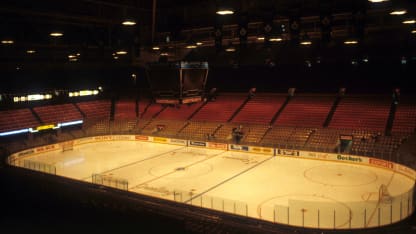With appropriate pomp and circumstance, nearly all living members of the Maple Leafs marched onto the ice. They ranged from Horner, who was 90, to the heroes of the dynasties of the late 1940s and 1960s, to stars of the 1970s and 1980s such as Darryl Sittler and Dave "Tiger" Williams. The current Maple Leafs, showered and dressed, were on hand as well.
There was a passing of the torch (actually a banner) from Horner to Maple Leafs captain Mats Sundin. Doug Gilmour, Sundin's predecessor and now Chicago's captain, was also there; he had helped the Blackhawks to their victory with a goal and an assist. Gilmour received one of the loudest ovations, a tribute to his play with Toronto earlier in the 1990s, when he scored 131 goals and 452 points in 393 games.
"I didn't cry," Gilmour said when asked about standing along the blue line for the national anthems. "I was nervous and excited. I spent some quality years here. … There's a lot of great memories. It's hard to put into words."
One of the most emotional people on farewell night was Paul Morris, who served as the public address announcer since 1961.
"This is a sad night in some ways, but it almost feels like a celebration," he said. "We're leaving our home, the home we've been in our whole lives, and I think the rest of Canada feels the same way."
In the end, Maple Leaf Gardens, the last Original Six arena still being used by an NHL team, was a victim of its own success; after 2,533 regular-season and Stanley Cup Playoff games, it became too small to house the team that went decades without an unsold ticket. After two road games, the Maple Leafs returned one week later to their new home, the bigger, more opulent Air Canada Centre.
"When you look back, sometimes you wish you could stay," Brian Bellmore a member of the board of Maple Leaf Sports and Entertainment, told the Toronto Sun. "This place is strong enough to last for many years. It's just not big enough."


















